Eigenlijk zijn al zijn vrouwelijke personages gebaseerd op zijn krachtige moeder en grootmoeder, zegt Vamba Sherif (47). In zijn nieuwe, autobiografische boek Ongekende liefde vertelt de van oorsprong Liberiaanse schrijver zijn roerige levensverhaal aan zijn dochter Bendu. Een ode aan zijn geboorteland en de belangrijkste vrouwen in zijn leven.
‘Ik ben geboren in een geleerde en invloedrijke familie. De Sherifs waren een familie van theologen die in Liberia worden beschouwd als hoeders van de islam. Ze genoten aanzien en respect, en van heinde en verre kwamen mensen mijn ouders en ooms om raad vragen. Sherif Quarter, de compound in Kolahun waar wij woonden, werd bestierd door mijn moeder. Zij was een zakenvrouw en runde winkels, benzinestations, huizen. De gemeenschap bestond uit zo’n tweehonderd mensen, dus er was altijd levendigheid. Na het ontbijt van rijstepap gingen de jongens de compound vegen en de meisjes water halen bij de waterput. ’s Middags kregen we les in het Arabisch en Engels, van docenten uit Liberia, Guinee of Sierra Leone.’
‘Ik was een ongelooflijk nieuwsgierig, stout jongetje. Alles wilde ik uitproberen, en daardoor deed ik dingen die niet door de beugel konden. Zo zette ik bijvoorbeeld op een dag een masker op van het heidense Poro-genootschap. Binnen onze gemeenschap was dat een taboe. Iedereen sprak er schande van.’
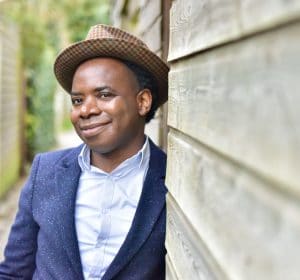
‘Die nieuwsgierigheid werd me op mijn elfde noodlottig. Ik groeide op tussen boeken en las graag. Onze familie had een bibliotheek waarin kostbare, handgeschreven boeken lagen die verboden waren voor mensen onder de veertig jaar, de leeftijd waarop je in Liberia als geestelijk volwassen werd beschouwd. De kamer waarin die boeken werden bewaard, was dus altijd op slot. Ik wist dat daar ook boeken van mijn vader lagen, die was overleden toen ik nog maar een jaar of vijf was. Ik hoorde mensen altijd praten over hem. Hij scheen prachtig te hebben kunnen schrijven, maar zijn handschrift had ik nog nooit gezien.’
‘Op een dag kon ik mijn nieuwsgierigheid niet langer bedwingen. Via de zolder wist ik door het plafond in de kamer met geheime manuscripten te komen. Ik kan nauwelijks beschrijven wat het voor mij betekende om eindelijk dat prachtige handschrift van mijn vader en mijn grootvader te zien. Te begrijpen waar al die mensen steeds over hadden gesproken.’
‘Maandenlang stond ik stiekem bij een kier zonlicht het ene na het andere manuscript te lezen – ik begon bijna te geloven dat het normaal was wat ik deed. Tot ik op een dag ineens de stem van mijn zwager hoorde – ik was gesnapt. Aan zijn intonatie hoorde ik direct dat dit ernstige consequenties zou krijgen. De dagen erna zwol in onze compound een koor van verontwaardiging aan, dat groeide en groeide. Niemand in de familie toonde begrip. Ik wilde het liefst verdwijnen.’
‘Wat ik had gedaan was zó ernstig dat er werd besloten dat ik weg moest: ik werd verbannen. Van de ene op de andere dag viel mijn wereld, die tot dat moment vol warmte en liefde was geweest, uit elkaar. Mijn gevoel van veiligheid was in één klap weg. Ik voelde ik me compleet verlaten. Eenzaam en verstoten.’
‘Mijn oudere broer Vamuyah had een aanstelling gekregen aan de universiteit in Koeweit en nam mij met zich mee. Daar woonden we in een appartement met andere, aardige mensen. Ik ging er naar school, we hadden boeken en er werd voor ons gekookt. Het was een rijk leven dus, maar tegelijk arm, zo zonder mijn moeder en mijn oma. Eén keer heb ik hen nog gezien, tijdens een korte vakantie in Liberia. Een prachtige tijd, maar omdat het me zo’n pijn deed om weer afscheid te moeten nemen, vertrok ik op de laatste dag in alle vroegte zonder gedag te zeggen. Terug ik Koeweit hoorde ik dat mijn oma was gestorven.’
‘Vlak daarna brak in Liberia een burgeroorlog uit en begon in Koeweit de Eerste Golfoorlog. Opnieuw moest ik vertrekken, nu vanwege de oorlog. Samen met Vamuyah en mijn neef Alpha ontvluchtte ik het land. We kwamen in een vluchtelingenkamp in Jordanië terecht. Alpha en ik reisden vervolgens door naar Nederland. Na drie jaar onzekerheid kreeg ik eindelijk een verblijfsvergunning. Ik ging rechten studeren en trouwde met een Nederlandse vrouw. Met onze zoons Jamil (16) en Noah (13) en dochter Bendu (11) wonen we in Groningen.
[tekst loopt door onder de foto]
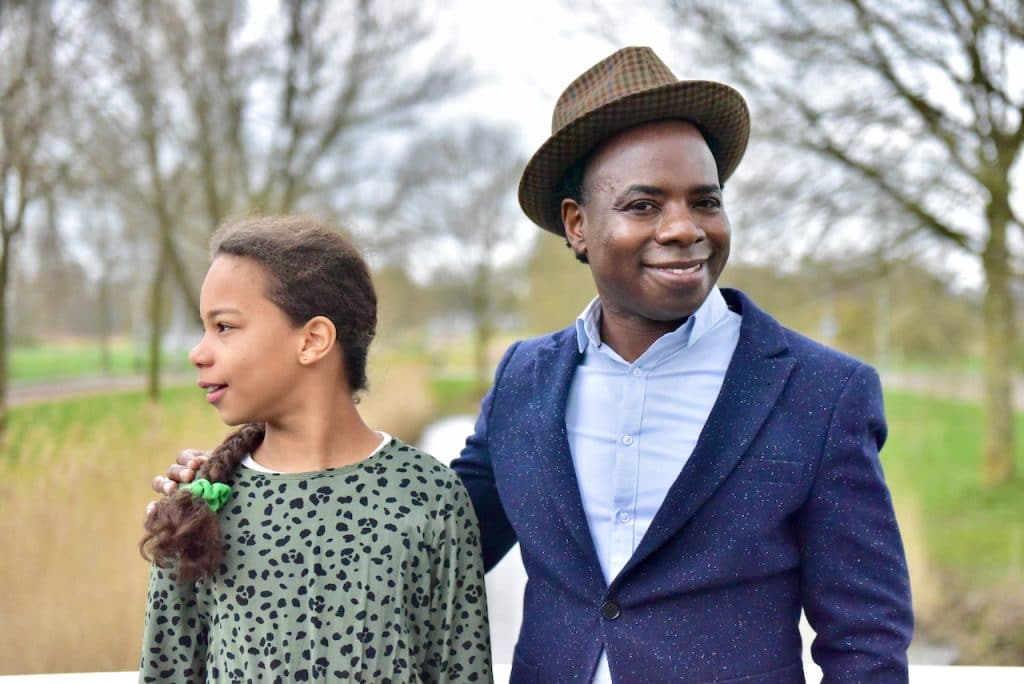
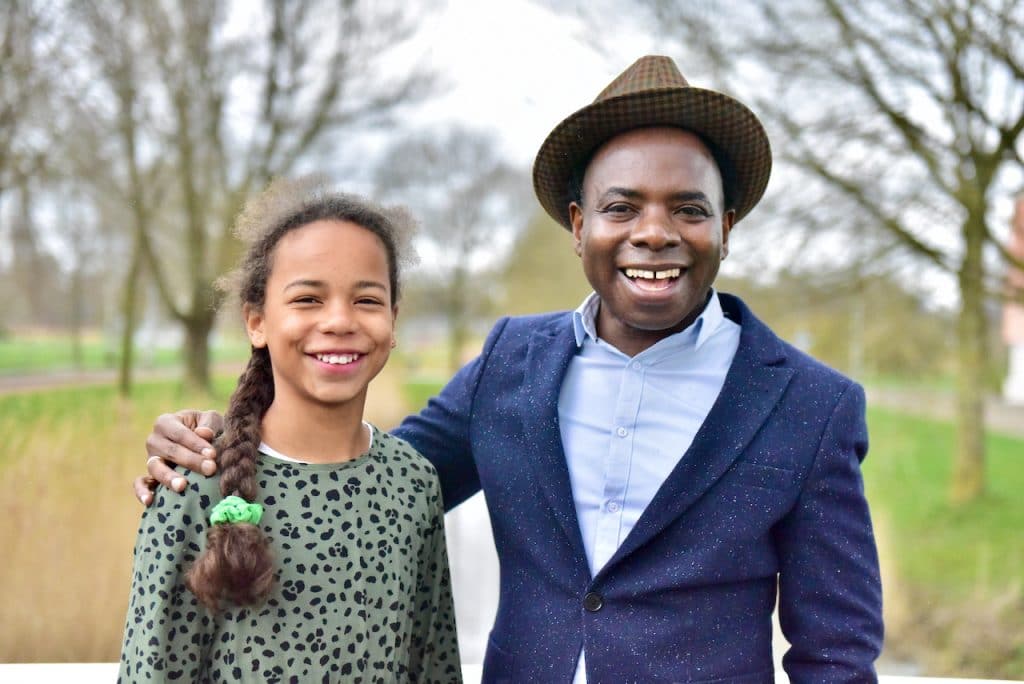
‘Het heeft jaren geduurd voordat ik dit boek kon schrijven. Als het over mijn oma ging, zat ik al na een paar seconden te huilen. Mijn jeugd draaide om haar. Zij was degene die me opvoedde; ze beschermde me en stond altijd voor me klaar. Ze was een prachtige vrouw, en kon heel mooi zingen – haar liedjes ken ik nog steeds uit mijn hoofd. Schrijven over haar dood kon ik niet aan.’
‘Maar omdat ik me de afgelopen tijd moest verhouden tot allerlei vraagstukken waarmee de wereld nu worstelt, zoals zwart zijn, thuishoren, afkomst en migratie, wilde ik mijn gedachten daarover bepalen en verwoorden. Die twee vrouwen hebben me gevormd, ze komen in alles terug. Alle vrouwelijke personages in mijn boeken zijn gemodelleerd naar hen: sterke, onafhankelijke en ondernemende vrouwen.’
‘In Bendu zie ik veel van hun temperament terug, maar ook in mijzelf herken ik veel. Mijn moeders vrijgevigheid en openheid hebben me geïnspireerd. Elke vrijdag verdeelde ze geld onder de armen en ze zorgde ervoor dat kinderen konden leren en studeren. Ik herinner me nog dat een arme vrouw mijn moeder aanklampte op straat en vroeg of ze haar dochter naar school kon sturen, waarop mijn moeder haar opnam in onze compound.’
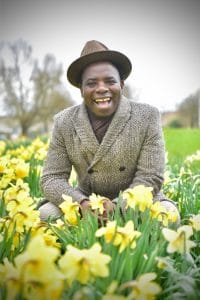
‘Je niet vastklampen aan je geld, maar het delen met anderen en je voor anderen opstellen en hen met liefde tegemoet treden, dat heb ik van haar geleerd. Ik voelde het haast als een plicht om die blik en manier van leven te delen via dit boek, omdat zulke waarden nodig zijn in een tijd van populisme en vreemdelingenangst. Ik hoop dat mijn boek de lezer laat zien dat mensen in Afrika, in Liberia, niet per se een minder waardevol leven hebben dan hier. Ook daar wonen mooie, wijze mensen van wie we iets kunnen leren. Geen enkele manier van leven is superieur, dus laten we luisteren naar elkaars levensverhaal en ons met elkaars ervaringen verrijken.’
‘Mijn migratie en de korte tijd dat ik in een vluchtelingenkamp verbleef in Jordanië, hebben mijn gevoel van thuisloosheid versterkt. Wat ik in dat kamp zag, wens ik niemand toe – het was er een hel. Veel mensen vinden dat vluchtelingen dankbaar moeten zijn dat ze hulp krijgen, maar het is een heel zwaar leven. Er is geen toekomstperspectief, geen hoop. Mijn leven was een en al angst. Als je ineens je leven niet meer in eigen hand hebt en anderen beslissen over alles – wat je eet, wat je doet –, dan tekent dat je voor het leven.’
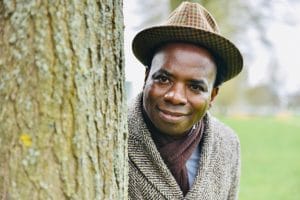
‘In ons rijke Nederland, waarin we écht een verschil zouden kunnen maken voor mensen die het moeilijk hebben, doen we weinig tot niets voor vluchtelingen. We beginnen direct over hun plichten, zonder te luisteren naar wat ze hebben meegemaakt. Er is weinig empathie voor migranten. Dat maakt me verdrietig. We beseffen te weinig dat het echt een wonder is als vluchtelingen ondanks wat ze hebben meegemaakt nog succesvol kunnen meedraaien in de samenleving.’
‘Nog steeds ben ik aan het leren mijn angst te beteugelen en los te laten. Schrijven is mijn redding geweest. Met elke roman die ik schrijf, breng ik een klein stukje terug van de wereld van mijn jeugd en de mensen van wie ik hield, alles wat niet meer bestaat. Van mijn verlies kunst maken en dat delen met de wereld is voor mij een manier om te kunnen omgaan met mijn ervaringen en trauma’s.’
Vamba Sherif, Ongekende liefde. De Geus, €20,00.
